Prussian Artillery attacked at the Battle of Langensalza 1866
Also called the Austro-Prussian War, this brief conflict was a key step in Chancellor Otto von Bismarck’s (1815–98) campaign to establish Prussia as the preeminent German power, the nucleus around which a genuine German nation would coalesce. Prussia’s archrival for dominance was Austria, and Prussia attacked it vigorously. Aside from the war’s crucial political significance, it would prove a tactical milestone as well, as the first European war in which railroads played a major role. Prussia used its extensive rail network to maneuver and advance quickly. This immediately gained Prussia the advantage, and the general in chief, the brilliant Helmuth von Moltke (1800–91), never let the advantage slip. Second only to the Prussian railroads in tactical significance was firepower. Prussia had advanced artillery and breechloading small arms. The Austrians had older artillery and still labored with slow, muzzle-loaded rifled muskets. Of the war’s eight major battles, the Prussians suffered a reversal only at the first, Langensalza (June 27–29, 1866), and this at the hands of the Hanoverians, not the Austrians. Even so, the Hanoverian victory was a hollow one; that state’s king was forced to surrender in the face of an overwhelming Prussian concentration.
Hanover began in an excellent position as the Prussian attack happened to occur during Hanoverian summer exercises and their army was already mobilized. Realizing the vast size of the total Prussian force, King George directed his 19,000 man army under General Alexander von Arentschildt to quickly withdraw and march south to link up with Bavarian allies. Prussia pressed 40,000 total troops into Hanover, which then split into four detachments under Generals Falckenstein, Goeben, Flies, and Beyer. General von Falckenstein, recognizing the absence of an army to fight, marched unopposed into the Hanoverian capital, north of the marching Hanoverians. General Helmuth von Moltke, the Prussian theater commander, also ordered Goeben to the north, and in turn deployed Beyer to the Hanoverians’ South and Flies, with 9,000 troops, quickly marched around to the West. This formed a box around the Hanoverian army with Prussia itself forming the Eastern side.
Moltke ordered Flies to hold fast and intercept Hanoverians trying to break through westward as Falckenstein’s force performed the main Prussian assault from the north. In direct defiance of his orders, General Flies gathered his detachment and directly attacked the Hanoverian army. Following a feint toward Thamsbruck to the North, the Prussian forces under Flies made a concentrated assault toward Merxleben. The much larger Hanoverian force and artillery fire drove them back toward the actual city of Langensalza. Having a force more than twice the Prussian detachment’s size, Arentschildt severely routed Flies’ troops, capturing more than 900 men.
Although the Hanoverians attained a decisive victory in the actual battle, the fighting halted their movement and allowed the other Prussian forces from the north and south to converge on the battle site. Out of options, King George and the Hanoverians pulled back to the East, further from their Bavarian allies. Pinned down against the Harz Mountains and out of options, King George surrendered in Nordhausen two days after the battle.
